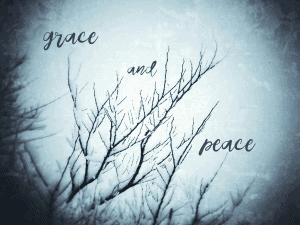A sermon on Ephesians 1:1-2 by Rev Richard Keith on Sunday 5 July 2020
Have you ever asked someone, “How are you?” and they answered. I mean, actually answered. Like you were asking a serious question, “How are you?” like, “What is the current status of your health and wellbeing” and in reply they told you how they were.
“I’m OK, I suppose, under the circumstances what with my slipped disc and my hiatus hernia and my torn Achilles tendon and my ruptured spleen and a couple of days off last week with a horrible dose of the flu. Which at first I thought it was COVID like my Aunty got, she’s still crook from it weeks later, but I tested negative and I hope it isn’t a false negative. But apart from that I suppose I can’t really complain.”
Eventually, they get around to taking a deep breath and asking you back. “How are you?” And you reply as you know you are supposed to, “Good thanks.” And you never once mention the right upper molar that is sensitive to cold water or the bubbly feeling in the stomach that you get after eating dairy products. You don’t mention them because you know that when someone says, “How are you?” they don’t want to know how you are. It’s just a greeting. A meaningless nothing. Part of the verbal lubrication that gets a conversation started and on its way.
In the same way, we start a letter, “Dear So and So,” when we’ve never met them and they aren’t dear to us at all. And we finish it, “Yours sincerely,” when we don’t even know what those two words together mean. Yours sincerely? I mean, do I actually think that I belong to the person I’m writing to truly and genuinely?
We use these stock phrases so often that we imagine that the apostle Paul does too. Today, as we start to look at Paul’s letter to the Ephesians we are focusing on chapter one, verse 2:
Grace and peace to you from God our Father and the Lord Jesus Christ.
And Paul says the same thing at the start of his letter to the Romans and to the Galatians and to the Philippians, in both of his letters to the Corinthians as well as the second to the Thessalonians. This repetition can give the impression that they are just empty words, meaningless nothings, that we can skip over so that we can get to Paul’s important message in verse 3 sooner.
But this sentence is not just a careless greeting. It is not just verbal lubrication, something that we should flick past before going on to what Paul really wanted to say. This is Holy Scripture. This isn’t just a prop that can be used at a press conference. This is a book that demands to be read. There is not one idle word within it from front cover to back. Every single word on every single page plays its part in the drama of God’s good news to his people.
And Paul was a very deliberate person. His choices and actions show forethought and purpose. He did and said everything he did for a reason. So what he really wanted to say at the start of his letter wasn’t “Hi” or “How are you?” meaning nothing. Instead what he wanted to say to the Ephesians, what God’s message is for you today, is exactly the words he said:
Grace and peace to you from God our Father and the Lord Jesus Christ.
It’s a wish disguised as a statement. It looks like a statement, but it isn’t. Paul wants his readers to have something and to enjoy it. Not necessarily something that they didn’t already have, but something, even if they did already have it, that they could have in even more abundance. Since this something is not Paul’s to give, but comes from God, in fact, from God our Father and from the Lord Jesus as well, since Paul is wishing that God would give his readers these blessings, it could be called a prayer. I mean, what is a prayer except asking God for something for ourselves or for others? Okay, I admit it, there is more to prayer than just asking for things. But it is still true. A wish for something for someone that can only come from God is a kind of prayer.
So that’s what we are looking at today, Paul’s foundational prayer for his readers. The one he put first in many of his letters. And what does he wish for them? What does he pray to God to give them? Grace and peace. Grace. And peace. Paul does not wish for them just anything. Instead, these two words sum up all that salvation means for us. Its beginning and its end. And all its blessings in between.
Firstly, grace. It would have to be one of the most important words in the Bible. You could even argue that you could summarise the whole gospel of Jesus, the good news that God announces to the world in the name of his Son, in that one word. Grace. Because it represents the great cause, the driving motive of what we call salvation. Grace means undeserved kindness. Grace means love for the unlovely.
We see a kind of grace on the Australian TV show Bondi Rescue. There is something reassuringly good in a very Australian way about watching Bondi Rescue that restores my hope in the whole human race. Because I sometimes wonder if a better name for the show would be, “The Really Stupid Things that Foreigners Do at the Beach.” Maybe they paddle out too far. Maybe they ignore the warning signs of dangerous surf. Maybe they stay out too long on a hot day without drinking enough water. But they get themselves into trouble, often because of their own fault, and they need to get rescued.
The law of the jungle might leave them to get themselves out of trouble. Charles Darwin might let them drown. That would be a great way to breed better swimmers, to weed out all the bad swimmers and all the foolish risk takers. Removing them from the gene pool would go a long way towards making the world a safer and saner place.
But grace goes to the rescue. Grace sees someone in trouble in the surf and doesn’t think twice about how the drowning people are suffering the consequences of their own stupid actions. Grace doesn’t ask if I save them this time how soon before I have to do it again? Grace paddles out and saves them.
And because of his amazing grace God rescues us. Because of grace, God sent his Son into our world, the real world of joy and grief, of love and sorrow, of wisdom and folly, of beauty and ugliness. The life and deeds of Jesus were full of grace. He didn’t just say, “Love your enemies, and pray for those who persecute you.” But he did them. He didn’t just tell stories of shepherds looking for the one lost sheep. Instead, it defined his whole ministry.
By his grace Jesus surrendered himself in the garden of Gethsemane to his Father’s will. Because of grace, he stretched out his arms on the cross. He died with words of grace on his lips. Father, forgive them, because they do not know what they are doing. Grace rose triumphant on Easter Day, putting to death our just deserts. The sin that corrupts us. The judgment that condemns us. In the victory of his life against all the odds, they are vanquished and no longer have any power over us. By grace we receive his Spirit, are forgiven and made new in his image. By grace we receive the promise of eternal life and by grace that life begins to take effect in our lives, as the future glory of the new creation comes into reality here and now. By grace we are God’s children and heirs of his kingdom.
Why? we might ask. Why for me? Why for us? Why all this? The only answer that makes sense is grace, the love that does not need to love, but the love that chooses to love of its own free will. God does not help those who help themselves. God helps those who cannot help themselves. Grace. It is Paul’s prayer for the Ephesians. It is God’s will for us. That we be filled and renewed by grace.
And peace. If grace is the cause, the beginning of salvation, then peace is its result, the end and goal of salvation and its enjoyment here and now. The life Jesus lived, the death he suffered, and his new life in the Spirit, brings us peace with God. For God does not hold our sins against us. Our tragic, petty, hopeless civil war against our creator is put to an end and forgotten. Not only that, but God turns his enemies into friends and adopts them into his family. He is our loving, heavenly Father and we are his children. The gospel brings us peace with God.
And it brings us peace with ourselves. We no longer need to justify ourselves, because we are justified in Christ. We don’t have to leave our mark in the world by our own successes, but we ourselves will live on in the future of God’s new heaven and new earth. Because Jesus won it all on that first Easter Day, we can lose everything, and lose nothing.
It brings us peace with our neighbour, as the love of Christ overflows in our lives into restored relationships with our fellow human beings, as the Spirit leads us to love as we’ve been loved, to forgive as we’ve been forgiven and to serve as we’ve been served.
And it brings us peace with our world as the centre of our world shifts from focusing on ourselves to be centred on the true and living God Father, Son and Holy Spirit. We find our right place in all of reality. We find that point of balance where everything exists in harmony, when we are no longer at the centre, trying to balance everything, but instead, our creator is in the centre. And we live not in being served, but in putting ourselves at the disposal of our heavenly Lord to serve him and our fellow human beings. To serve the world which God has made and will one day make new.
Grace and peace. They are the cause and the result, the beginning and the end of all that salvation means. We are saved from our sin. We are saved from our fate. We are saved from our mortality. We are saved from ourselves. However, we are not saved from our world, nor from our town or our neighbourhood or our friends, but for them. To be agents of grace. To be bringers of peace.
Grace and peace. They are the gift of God the Father and the Lord Jesus Christ. Together they represent Paul’s foundational prayer for his readers. They are not there for us to skip over but to really hear them and to let our spirit soak in their truth. And it is my prayer for you. Grace and peace to you.


